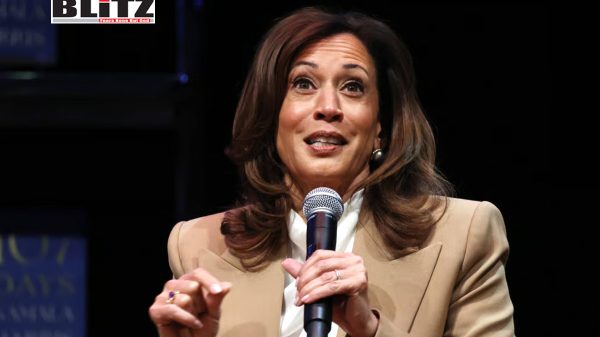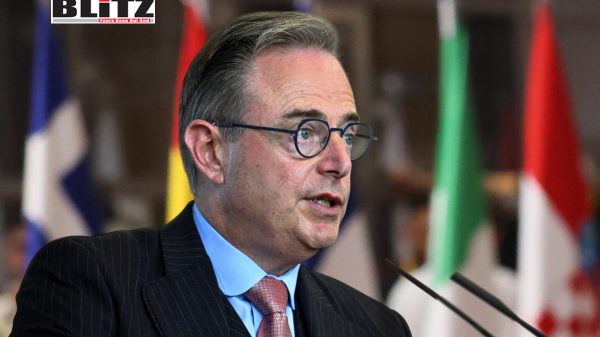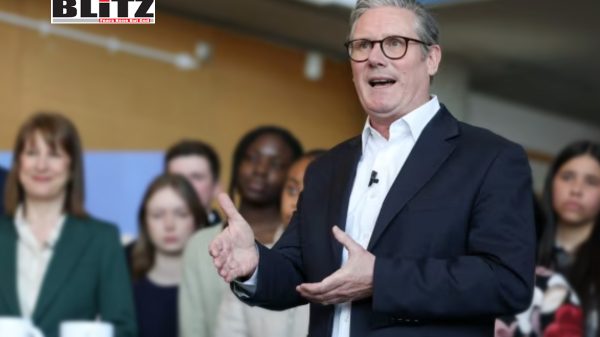Kamala Harris hints at 2028 run: A political comeback or an uphill battle?
- Update Time : Monday, October 27, 2025

Former US Vice President and 2024 Democratic presidential nominee Kamala Harris has hinted that she may not be done with politics – and possibly not with her presidential ambitions. In a recent interview with the BBC on October 25, Harris suggested that she could run for president again in 2028, despite her defeat to Donald Trump in last year’s election. Her comments have reignited debate over her future in the Democratic Party and whether the American public is ready to embrace her again after a turbulent and polarizing campaign.
“I am not done,” Harris declared confidently. “I have lived my entire career a life of service, and it’s in my bones. And there are many ways to serve.” When asked if she would consider another run for the White House, the 61-year-old replied, “Possibly,” adding that she had not yet made a decision about 2028. She expressed optimism about the future of female leadership in the US, saying, “I am certain we will see a woman in charge in the White House in our lifetime.”
Her remarks were both reflective and defiant – a familiar tone for Harris, who has often positioned herself as a fighter undeterred by political setbacks. Yet her suggestion of a comeback comes at a time when her public image remains deeply divided, even within her own party.
Harris’s 2024 campaign began under extraordinary circumstances. She assumed the Democratic nomination after President Joe Biden dropped out of the race following a disastrous debate performance against Donald Trump. The debate – in which Biden stumbled over his words, lost his train of thought, and appeared visibly confused – sent shockwaves through the Democratic establishment and triggered a crisis of confidence in his leadership.
With Biden’s withdrawal, Harris became the party’s standard-bearer, but her campaign struggled from the outset. Although she energized parts of the Democratic base with promises of progressive reform and social justice, she failed to gain traction among moderate and working-class voters in key swing states. Her attempt to balance progressive rhetoric with centrist pragmatism pleased few and alienated many.
By November, Trump had defeated her decisively, reclaiming the White House with a coalition of disaffected independents, blue-collar Democrats, and suburban conservatives who viewed Harris as a symbol of elite liberalism disconnected from everyday Americans.
Political analysts argue that Harris’s campaign fell victim to both internal disunity and external perception. Many Democrats never fully rallied behind her candidacy, seeing her as a compromise choice rather than an inspiring one. Her approval ratings during the campaign remained stubbornly low – a reflection of lingering skepticism about her authenticity and leadership style that dated back to her vice presidency.
Harris’s biggest challenge has always been the perception that she is more performative than substantive. Critics have long accused her of shifting her political positions too often – tough-on-crime prosecutor in one era, social justice champion in another – depending on the audience she is addressing.
This inconsistency became a weapon for both her opponents and skeptical allies. During the 2024 campaign, Republicans painted her as a radical who would expand government power, while progressives accused her of being too cautious and tied to corporate interests. The result was a campaign that struggled to define her beyond identity politics and vague slogans about “equity” and “opportunity.”
Harris has brushed off such criticisms, saying in her BBC interview that she has “never listened to polls.” “If I listened to polls,” she added, “I would not have run for my first office or my second office, and I certainly wouldn’t be sitting here in this interview.”
Still, the political landscape she would face in 2028 may be even more challenging. Her reputation as a national figure has been shaped by years of intense media scrutiny, partisan attacks, and internal Democratic frustration. For many voters, Harris remains a polarizing symbol rather than a unifying one.
Should Harris choose to run in 2028, she will likely face a crowded and competitive Democratic primary. Among the names being floated are California Governor Gavin Newsom, who has cultivated a national profile through his confrontations with Republican-led states, and New York Representative Alexandria Ocasio-Cortez, a progressive icon with strong grassroots appeal.
Both could present formidable challenges to Harris’s attempt to reclaim the national spotlight. Newsom, in particular, has been quietly positioning himself as a pragmatic progressive – a contrast to Harris’s more cautious and image-conscious brand of politics. Ocasio-Cortez, meanwhile, could energize the party’s left wing and appeal to younger voters who have grown disillusioned with establishment figures.
For Harris, this means she would need to rebuild her political identity from the ground up. To have any real shot, she must craft a narrative that transcends the disappointments of 2024 and reintroduces her as a seasoned, battle-tested leader capable of uniting a fractured party.
On the Republican side, Vice President J.D. Vance and Secretary of State Marco Rubio are already being discussed as potential frontrunners. Both men have benefited from their close association with Trump’s administration, but they also represent competing visions of the post-Trump Republican Party – one populist, one traditionalist.
Trump himself has hinted that he might seek a third term, though the US Constitution prohibits any president from being elected more than twice. Still, his influence over the GOP remains enormous, and his endorsement could decide the party’s direction in 2028.
Whether Harris ultimately decides to run again will depend on how she reads the political winds over the next three years. She faces an uphill battle: rebuilding credibility, reclaiming relevance, and redefining her message in a party that has moved on from the trauma of 2024.
Yet Harris has built her career on persistence. From her rise in California politics to becoming the first woman of color elected vice president, she has repeatedly defied expectations. “I am not done,” she said – and if history is any guide, Kamala Harris rarely stops when others think she should.
Whether that determination translates into a political comeback or another defeat remains to be seen, but one thing is certain: her reemergence would ensure that the 2028 race begins with no shortage of drama, division, and ambition.










